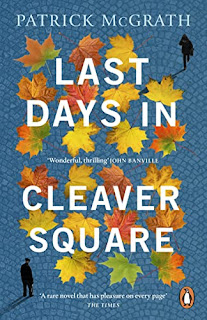Last Days in Cleaver Square - Patrick McGrath
Last Days in Cleaver Square has quite a few of McGrath’s familiar elements, not least of which is a narrator who appears to be gradually losing his mind, which can only be a good thing for fans of his deliciously delirious fiction, and it is indeed again an artist who is afflicted with the onset of madness here. Francis McNulty is an aging poet who in his youthful idealism to destroy fascism joined the International Brigade in the 1930s to fight the Falangists during the Spanish Civil War. Now in his dilapidated London home, his ability to write good poetry waning, he is visited by the ghostly apparition of Generalísimo Franco.
In 1975 however the monster is not yet dead, but he is 84 and very ill with a number of serious health conditions. So why the appearance of the “blackened, viscous, diminished, formless excrescence” of a not yet dead Spanish dictator? Evidently it must be connected to the horrific experiences of Francis during those troubled war years when he was in Madrid, but there are hints that the old Georgian house in Cleaver Square could be haunted by other ghosts in Francis’s past. The vividness and realness of the nighttime visitations could also be related to his artistic temperament, and in a Patrick McGrath book, you can imagine that it must be so. The question is where is this all going to lead?
Well, one thing for sure is that you can’t entirely trust the first-person narrator in a Patrick McGrath book, particularly one who is suffering from what appears to be mental illness or the onset of dementia. All we have to go on is what Francis tells us, and we aren’t quite sure how everyone is reacting to his visions, other than his own perception of it, which is nonetheless a fascinating perspective. Gradually, reluctantly, on the insistence of a journalist, Francis reveals some of his experiences in Spain, his struggles as an artist, and – again not untypical for a McGrath novel – issues of a difficult family background with Oedipal issues and sexual hang-ups. Combine dark secrets, unspoken atrocities and an expanding sense of guilt with old age and a fear of being left behind by the world, and we’re heading for trouble.
McGrath handles this Freudian psychodrama in his customary way, with elegant prose of beautiful clarity and precision which only makes occasional observations of family secrets and inclinations of sexual desire made in passing seem all the more eccentric and portentous. This all seems like it is heading for familiar McGrath territory of mental breakdown heading into Gothic horror, but the author finds an unexpected element of humour in all the darkness and – since we all know that Franco does indeed die in 1975 – even a resolution and sense of closure that few of his other tormented protagonists enjoy. The idea that even the worst horrors eventually come to an end is a most welcome sentiment at the present time, even if it’s also clear that the scars left behind can take a very long time to heal.




Comments
Post a Comment